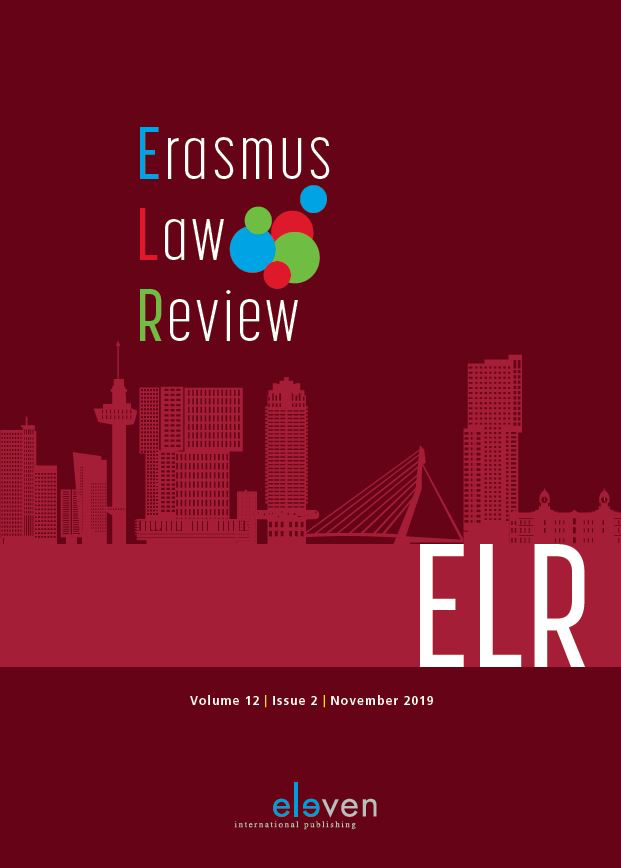|
Long before the coming of the Bill of Rights in written Constitutions, the common law has had the greatest regard for the personal liberty of the individual. In order to safeguard that liberty, the remedy of habeas corpus was always available to persons deprived of their liberty unlawfully. This ancient writ has been incorporated into the modern Constitution as a fundamental right and enforceable as other rights protected by virtue of their entrenchment in those Constitutions. This article aims to bring together the various understanding of habeas corpus at common law and the principles governing the writ in common law jurisdictions. The discussion is approached through a twelve-point construct thus providing a brief conspectus of the subject matter, such that one could have a better understanding of the subject as applied in most common law jurisdictions. |


Erasmus Law Review
About this journalSubscribe to the email alerts for this journal here to receive notifications when a new issue is at your disposal.
| Article |
|
| Keywords | Habeas corpus, common law, detainee, consitution, liberty |
| Authors | Chuks Okpaluba and Anthony Nwafor |
| AbstractAuthor's information |
| Article |
|
| Keywords | strategic culture, international law, ISIS, parliamentary debates, interdisciplinarity |
| Authors | Martin Hock |
| AbstractAuthor's information |
|
This article presents an interdisciplinary comparison of British and German legal arguments concerning the justification of the use of force against the Islamic State in Iraq and Syria (ISIS). It is situated in the broader framework of research on strategic culture and the use of international law as a tool for justifying state behaviour. Thus, a gap in political science research is analysed: addressing legal arguments as essentially political in their usage. The present work questions whether differing strategic cultures will lead to a different use of legal arguments. International legal theory and content analysis are combined to sort arguments into the categories of instrumentalism, formalism and natural law. To do so, a data set consisting of all speeches with regard to the fight against ISIS made in both parliaments until the end of 2018 is analysed. It is shown that Germany and the UK, despite their varying strategic cultures, rely on similar legal justifications to a surprisingly large extent. |
| Article |
|
| Keywords | European Convention on Human Rights, European Court of Human Rights, techniques of interpretation, the Vienna Convention on the Law of Treaties |
| Authors | Eszter Polgári |
| AbstractAuthor's information |
|
The interpretive techniques applied by the European Court of Human Rights are instrumental in filling the vaguely formulated rights-provisions with progressive content, and their use provoked widespread criticism. The article argues that despite the scarcity of explicit references to the Vienna Convention on the Law of Treaties, all the ECtHR’s methods and doctrines of interpretation have basis in the VCLT, and the ECtHR has not developed a competing framework. The Vienna rules are flexible enough to accommodate the interpretive rules developed in the ECHR jurisprudence, although effectiveness and evolutive interpretation is favoured – due to the unique nature of Convention – over the more traditional means of interpretation, such as textualism. Applying the VCLT as a normative framework offers unique ways of reconceptualising some of the much-contested means of interpretation in order to increase the legitimacy of the ECtHR. |
| Article |
|
| Keywords | contract adaptation, hardship, force majeure, investment contracts, arbitration |
| Authors | Agata Zwolankiewicz |
| AbstractAuthor's information |
|
The change of circumstances impacting the performance of the contracts has been a widely commented issue. However, there seems to be a gap in legal jurisprudence with regard to resorting to such a remedy in the investment contracts setting, especially from the procedural perspective. It has not been finally settled whether arbitral tribunals are empowered to adapt investment contracts should circumstances change and, if they were, what the grounds for such a remedy would be. In this article, the author presents the current debates regarding this issue, potential grounds for application of such a measure and several proposals which would facilitate resolution of this procedural uncertainty. |

 Issue 4
Issue 4